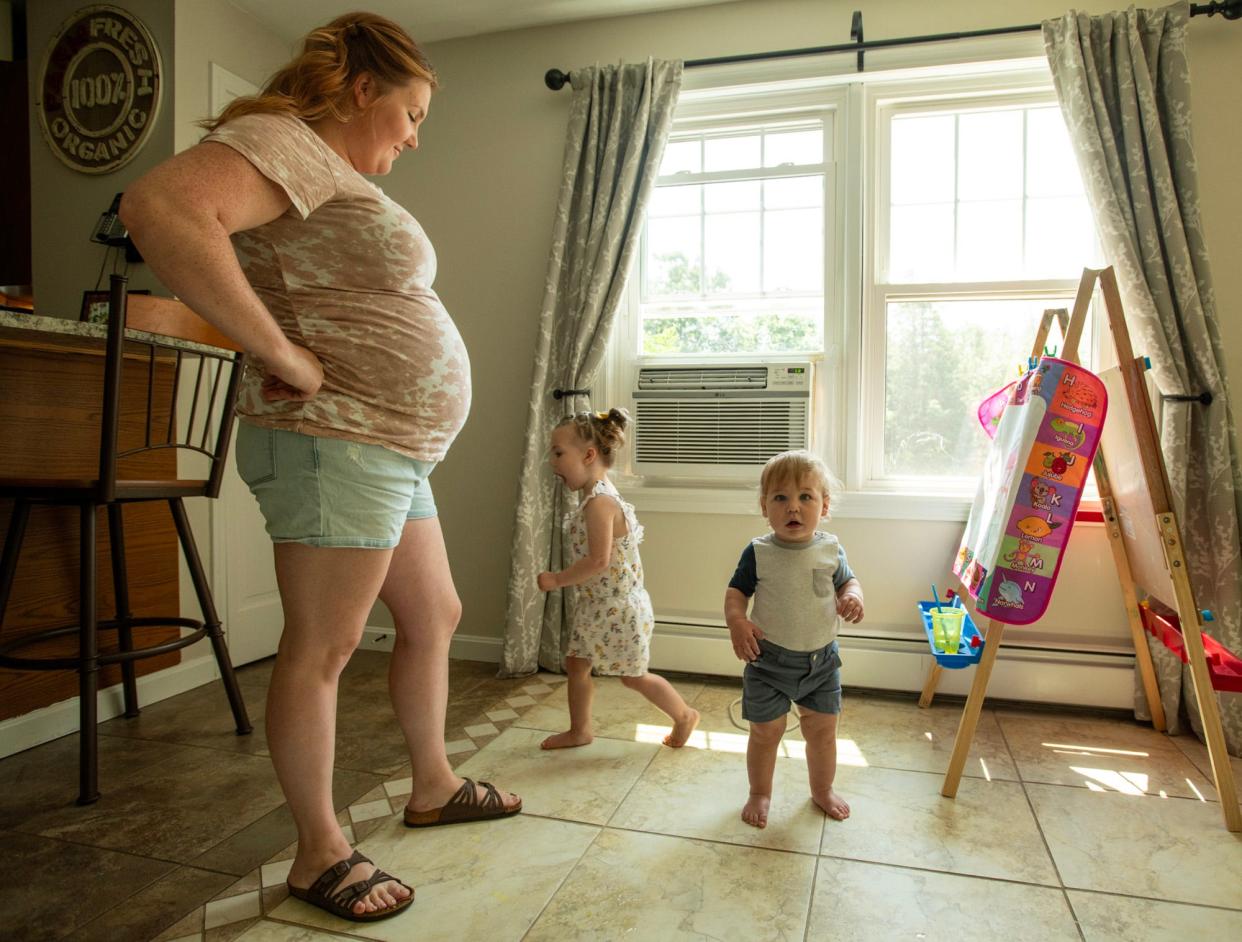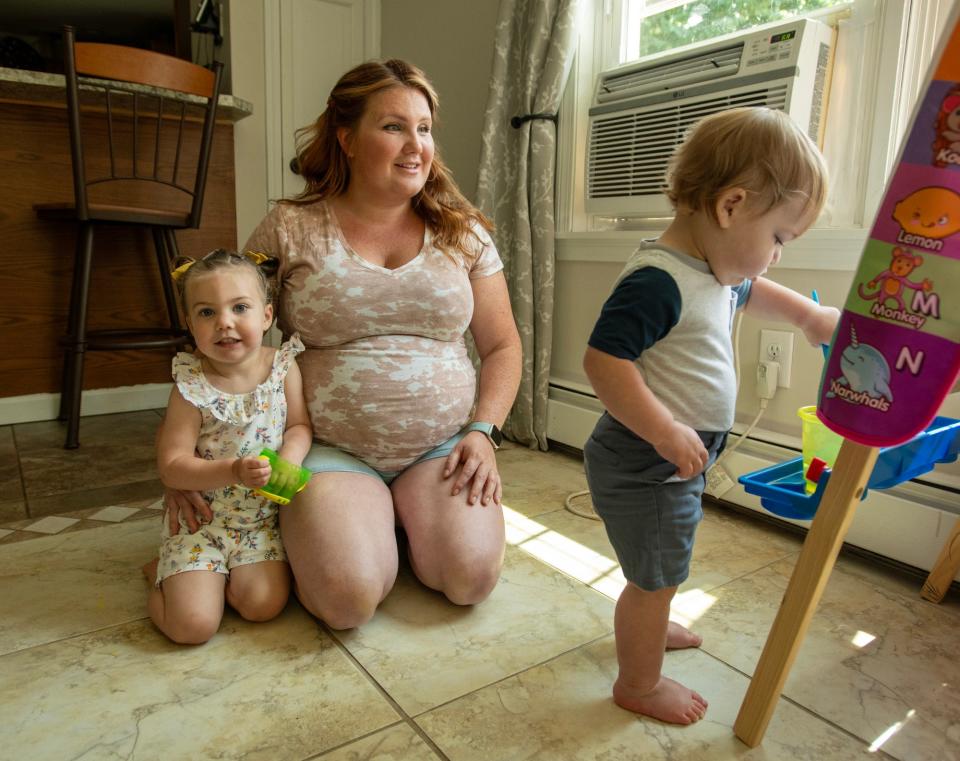State lawmaker: UMass Memorial leader doesn't get the seriousness of maternity closure

- Oops!Something went wrong.Please try again later.
TEMPLETON – The top executive at UMass Memorial Health doesn't understand the gravity of how closing the health system's maternity unit in Leominster will hurt the community, according to a state lawmaker. UMass Memorial said it's committed to providing high-quality health care.
Meanwhile, some doctors are surprised they had an agreement to boost staffing, only to be blindsided that UMass Memorial plans to close the unit in two months.
These developments come as families in North Central Massachusetts are concerned about the impending closure. Lauren Colameta of Templeton is expecting her third child in October, and she's anxious about what is happening in Leominster.
Colameta juggles her duties as a mother with a full-time job as a critical care nurse at the UMass Memorial hospital in Leominster. That juggling was recently on display as Colameta had her hands full, taking care of her two young children, who have a lot of energy.
As Cecilia, 2, and Walter, 1, scooted around the family’s home in Templeton under Colameta’s watchful eye, she spoke about her family’s deep connection to the labor and maternity unit at UMass Memorial HealthAlliance-Clinton Hospital, Leominster Campus.
Colameta and her three siblings were born in the unit, so were Colameta's two children, and she hopes her third child will be born there. Her due date falls on Oct. 13.
However, that plan may have to change, because UMass Memorial Health announced in May that it will close the unit on Sept. 22, citing falling birth numbers and a staff shortage. If Colameta goes into labor after that shutdown date, she plans to drive to UMass Memorial Medical Center in Worcester to bring her child into the world.
If traffic is backed up, that trip can take an hour, or more. It's a prospect that makes Colameta nervous, because she experienced elevated blood pressure shortly before Cecilia and Walter were born. Everything checked out fine after Colameta was seen by the medical team at the Leominster maternity unit.
But a recurrence of that condition weeks or days before her next delivery, coupled with not having the quick 20-minute trip to Leominster to get checked out, has Colameta concerned.
“There’s lot of uncertainty,” she said.
Doesn't understand why the community is fired up
In a recent closed-door meeting with Dr. Eric Dickson, president and chief executive officer at UMass Memorial Health, state Rep. Natalie Higgins, D-Leominster, said she pushed to keep the unit open. However, she said, Dickson didn't appear to indicate a strong commitment to save the unit.
“(Dickson) seemed to not understand why the community was so fired up,” said Higgins. "I tried to appeal to him to understand the safety and fear of the community to not have a labor and birthing unit."
When asked if Dickson got the message, Higgins said, "I don't think so."
Higgins noted she and others met separately with Steve Roach, president of UMass Memorial Health Alliance–Clinton Hospital, to lobby for the unit's survival.
In a prepared statement to address the meetings, UMass Memorial Health called the planned closure "difficult" and said it's committed to having more dialogue with the community to ensure residents get high-quality care.
"We appreciate the ongoing and constructive public dialogue about the difficult decision we have made regarding the proposed closure of inpatient maternity services at HealthAlliance-Clinton Hospital’s Leominster campus. Our leadership team at UMass Memorial Health recently met with legislators to continue the conversation so that they could learn more about our plan and the staffing challenges we face.
"We remain committed to listening and working with our community members and legislative delegation on ways to invest in community resources and to ensuring that our patients in North Central Massachusetts have access to the high-quality care and services they expect and deserve."
Agreement in place before announced closure
On the staffing front, there was an agreement in place to provide more doctors before the closure was announced, said Erin Kate Dooley, an obstetrician in private practice at Family Medical and Maternity Care Inc. in Leominster.
A total of four doctors were to provide “call coverage," meaning they’re on call if medical, labor and delivery services are required, said Dooley. Joining Dooley from Family Medical and Maternity Care was Sanjeevani Deolapure. The other doctors were Sridhar Iyer and Daniel Terk from Montachusett Women’s Health, which is part of the UMass Memorial Health system.
Discussions to add the doctors started in April, said Dooley, who said top leadership at UMass Memorial must have been aware of the agreement, because the four doctors had been placed on a published schedule of call doctors to help cover the maternity unit in July, August and September.
In a prepared statement, Dr. Charles Covagnaro, chief medical officer at HealthAlliance - Clinton Hospital, said the agreement didn't meet growing staff challenges.
"Agreements were established specifically to address the declining number of providers. While the providers had those agreements in place, they did not fully address the acute and growing challenges related to physician staffing. Further, these workforce challenges extend beyond physicians and impact the full spectrum of caregivers who are critical to appropriately staffing a maternity unit that meets the needs of the community."
Dooley believes the agreement provided enough staff to sustain the maternity unit in the near future, and the long-term needs would be met if UMass Memorial added up to three more medical providers.

In the three years Dooley has practiced medicine in Leominster, she said UMass Memorial Health failed to adequately recruit staff for the Leominster maternity unit to “avoid becoming a crisis moment.”
'Planned effort' to close maternity unit
Dooley called the decision to close the unit a "planned effort” to cut expenses.
Labor and delivery units nationwide are closing nationwide, especially in rural areas, noted Dooley, because they're historically money losers or generate limited profits. Robust staffing must always be on hand, and since no one can predict when births will happen, the amount spent on employees often exceeds patient volume.
Dooley believes UMass Memorial is shutting the unit to cut expenses and funnel patients to Worcester to consolidate care.
“Money was driving everything here,” said Dooley.
Move at Statehouse to give DPH more power
Pending bills at the Statehouse would give the state Department of Public Health more power to stop hospitals from closing essential services, including maternity. Currently, the DPH holds public hearings to determine if services a hospital wants to shut down are essential, but it has no legal power to stop closure.
Two hearings focused on the Leominster maternity unit are scheduled for July 24: a virtual one at 5:30 p.m., followed by a in-person session at 6 p.m. at the Hilton DoubleTree in Leominster.
Higgins believes there is precedent for governors to step in and take immediate steps in a public-health emergency. Given the closure of at least 10 maternity units statewide in the past decade, according to the Massachusetts Nurses Association, coupled with the impending closure in Leominster, Higgins feels those developments constitutes a public health emergency.
As a result, Gov. Maura Healey could work with lawmakers to fast-track the pending bills. However, Higgins is resigned that there’s not enough time to get those bills through the Legislature and on the governor’s desk in time to stop the Leominster unit from closing.
A request for comment from Healey’s office was not returned.
Higgins offered another point: If UMass Memorial’s maternity unit was struggling, why didn’t hospital executives reach out to lawmakers for help before it decided to close the unit?
“Having 600 families find a different place to give birth is not acceptable ... We have to keep the service here," she said.
Uncertainty affects hundreds of families
Those fighting to keep the maternity unit open argue closure will compromise patient health, and that a significant number of low-income families living in Leominster, Fitchburg and surrounding communities don’t have transportation to other maternity units, including services offered by UMass Memorial in Worcester.
Those concerns come as the prevalence of severe disease during and after childbirth nearly doubled in Massachusetts from 2011 to 2020. Pregnant mothers in the Black non-Hispanic community consistently experienced the highest rates of labor and delivery complications among all races and ethnicities, according to the Massachusetts Department of Public Health.

'It makes me sad'
When Colameta considers not only her wish to deliver her third child in Leominster but also the hundreds of families who will be impacted when the unit plans to close in September, she feels a tremendous sense of loss for the community.
“It makes me sad. I always thought a community hospital should serve the community. But that doesn’t seem to be the case now. It’s being run like a business now," she said.
Contact Henry Schwan at henry.schwan@telegram.com. Follow him on Twitter: @henrytelegram.
This article originally appeared on Telegram & Gazette: Closing of UMass Memorial Leominster maternity unit worries families

